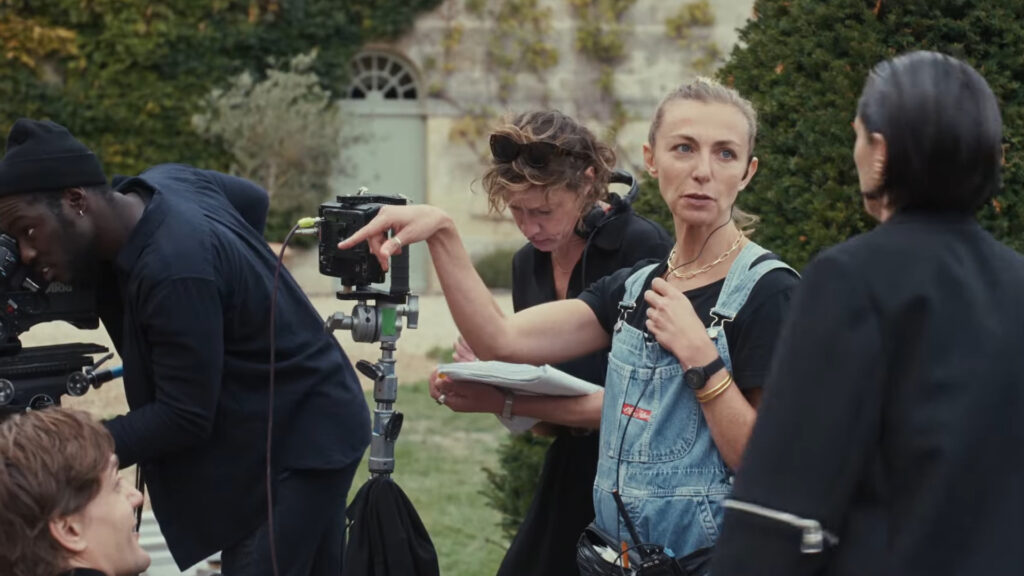The French mini-series hosted by Iris Brey shows the transformation of a woman who leaves heterosexuality and discovers the power of lesbianism and sorority as a tool for intimate and political emancipation.
It’s a close-up of the arm muscle activating as the hand penetrates. It’s a caterpillar that slowly moves up the thigh. It’s a tongue licking another in front of a giant screen. It’s a bruise that you touch. It is a sheet that can be washed by hand. Iris Brey’s feminist revolution infuses all plans of Splithis mini-series put online on FranceTV Slash since Friday November 24.
Advertisement
This lesbian love story is going well, and already, it changes everything. Because French production comes as a repair, a bandage over decades of Manichean and dehumanizing representations. Here, the lesbian is not a predator, the bisexual woman is not reduced to her guilt, the characters reflect on their condition in depth.
Certain reflections may seem didactic, to a part of the public already committed to the causes defended. But Split is not just a theoretical manifesto: it is an enveloping love story, whose sweetness and lyricism transcend the few awkwardnesses.
Consent, so good to hear
Split is also a story of consent. A ” Can I kiss you ? » which makes the cheeks blush, a “ I want you to take me » which makes you chuckle with its enthusiasm; all these sentences so rarely spoken in fiction, yet so good to hear. Where we also address consent in the disposition of the body, through maternity or abortion.
One could be mistaken, but the production is indeed an choral series – where Pauline Chalamet (Paola in the series) grabs the screen every time she appears. It is with the fourth episode that Split takes this magnitude, spreads its wings and shows all the other women who carry the world.
Advertisement
We begin to find in him an air of Sex Education, the progressive Netflix series whose mission is to unwind teenagers by putting kindness at the heart of relationships. And then there are these cigarettes smoked at damp dusk, close-ups of the hands in the bluish light, which seem to summon Kyss Mig (2011), the Swedish romance by Alexandra-Therese Keining, which rendered a proud service, almost ten years ago, to all lesbians in need of peaceful representation.

“I think it’s a dream”
In the distance, we hear the voice of actress Delphine Seyrig, a feminist icon ahead of her time, reminding us of the basics: “ The women I am called to represent are always far behind me and far behind women of my age and time. But how would one do otherwise ? I wouldn’t ask for anything better, but I think it’s a dream. It’s up to things to move forward, and then, cinema will move forward. »
We would have liked to be able to prove her wrong before she left, to show her that things can change. That women are fighting to give women space, in front of the camera, but also on film sets.
We would have liked to go even further, not having to explain why episode 4 of the series is not available on France TV Slash before 10:30 p.m. The guilty ? A scene from squirting which, despite several edits, would not have passed censorship rules (prohibited to under 16s). So, we will have to wait and hope that this rule will not break the viewing momentum of spectators.
Leaving heterosexuality to enter resistance
Iris Brey had to fight to come up with a story “ without antagonist », as she told us in an interview. A choice which highlights how French television is not accustomed to this bias.
The antagonism is nevertheless there, embodied in fragments in gestures, remarks or insults. The two guys having fun insulting dykes in front of a bar. The trans girl and the black guy who are systematically stopped by the police. The rape recounted on A4 sheets, glued to the walls of the city, between friends.
By leaving heterosexuality, stuntwoman Anna (Alma Jodorowsky) joins the resistance, the resistance that we do not choose, which opens our eyes to the violence of a world that is not made for us. Here, however, the environment depicted remains very white, bourgeois and educated – longer episodes would surely have allowed a greater multiplicity of identities to be explored and left more room for intersectionality.
The biggest antagonists are in fact off-screen: it is Emmanuel Macron who ensures that the masculine makes the neutralit is Gérald Darmanin who says thatit’s going to go wellit is the cinema which separates the man from the artistthe series which make fun of intimacy coordinators, the cinema, again, which forces us to like films that don’t like us.
Iris Brey shows us another dissident path, one way to dykeland, as Rebeka Warrior sings in the incredible soundtrack (co-composed with the magician Maud Geffray). A one-way ticket into lesbianism as a tool of political and intimate emancipation, a tool of joy, sorority, complicity, laughter, power, love, support, orgasms, dialogue, passion, ex -straight, etc.
The verdict


We liked
- A story that feels good
- The impeccable soundtrack
- Well done lesbians
We liked it less
- A sometimes didactic speech
- The censorship of episode 4 on FranceTV Slash
Iris Brey’s series is one of the rare French productions to show so well the joy of a lesbian romantic relationship, anchored in a modern heteropatriarchal society. A sort of realistic utopia, which provides keys to finding power in sorority and alternative ways to create bonds.
